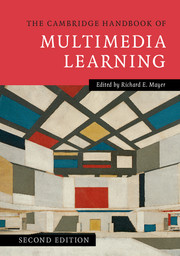Book contents
- The Cambridge Handbook of Multimedia Learning
- The Cambridge Handbook of Multimedia Learning
- Copyright page
- Contents
- Contributors
- Preface
- Acknowledgments
- 1 Introduction to Multimedia Learning
- Part I Theoretical Foundations
- Part II Basic Principles of Multimedia Learning
- Part III Advanced Principles of Multimedia Learning
- Part IV Multimedia Learning of Cognitive Processes
- Part V Multimedia Learning in Advanced Computer-Based Contexts
- 29 Multimedia Learning with Intelligent Tutoring Systems
- 30 Multimedia Learning with Simulations and Microworlds
- 31 Multimedia Learning with Computer Games
- 32 Multimedia Learning with Video
- 33 Multimedia Learning from Multiple Documents
- 34 Multimedia Learning in e-Courses
- Author Index
- Subject Index
31 - Multimedia Learning with Computer Games
from Part V - Multimedia Learning in Advanced Computer-Based Contexts
Published online by Cambridge University Press: 05 August 2014
- The Cambridge Handbook of Multimedia Learning
- The Cambridge Handbook of Multimedia Learning
- Copyright page
- Contents
- Contributors
- Preface
- Acknowledgments
- 1 Introduction to Multimedia Learning
- Part I Theoretical Foundations
- Part II Basic Principles of Multimedia Learning
- Part III Advanced Principles of Multimedia Learning
- Part IV Multimedia Learning of Cognitive Processes
- Part V Multimedia Learning in Advanced Computer-Based Contexts
- 29 Multimedia Learning with Intelligent Tutoring Systems
- 30 Multimedia Learning with Simulations and Microworlds
- 31 Multimedia Learning with Computer Games
- 32 Multimedia Learning with Video
- 33 Multimedia Learning from Multiple Documents
- 34 Multimedia Learning in e-Courses
- Author Index
- Subject Index
Summary
In this chapter recent research focusing on the use of multimedia computer games for instruction is reviewed with an emphasis on the effects of games on improving cognitive processes. The research suggests that the greater the overlap in cognitive processes between games and external tasks, the more likely is transfer to non-game tasks. In addition, accumulating evidence suggests that playing fast-paced action games improves cognitive processes dealing with attention, task switching, and resistance to distractors, with some transfer to untrained domains. Studies with older adults suggest that intense computer game training may improve some cognitive processes. Results also indicate that although game playing reduces time spent on schoolwork, integrating games into the curriculum is likely to increase the probability of transfer from games to curricular goals. Finally, research identifying the cognitive processes engaged by multimedia presentations outside of games is recommended in order to clarify multimedia effects and facilitate studies of whether multimedia presentations are differentially beneficial for different groups.
Keywords
Information
- Type
- Chapter
- Information
- The Cambridge Handbook of Multimedia Learning , pp. 762 - 784Publisher: Cambridge University PressPrint publication year: 2014
Accessibility standard: Unknown
Why this information is here
This section outlines the accessibility features of this content - including support for screen readers, full keyboard navigation and high-contrast display options. This may not be relevant for you.Accessibility Information
- 10
- Cited by
